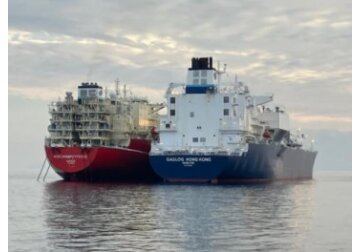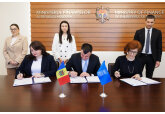
Moldova has made enormous progress in the gas market in recent years and has moved from purchasing gas from only one supplier - Gazprom - to diversified gas purchases even from different countries, including the United States.
The Ministry of Energy announced this, noting that this progress is highly appreciated by external partners, and the innovative use of the Trans-Balkan pipeline in reverse mode for gas storage in Ukraine has made Moldova a provider of energy security in the region. The department recalled that, with the exception of the last two winters (2022-2023 and 2023-2024), the only source of natural gas purchases for Moldova was Russia, so politicians from Moscow often referred to this vulnerability. Alternatives were impossible either physically, due to the lack of alternative network infrastructure built during the Soviet period, or legally, since this was prohibited by the contract with Gazprom. Moreover, for several years in a row, the Russian concern has been opposing the spin-off of the transmission network operator owned by its subsidiary Moldovagaz, thereby blocking for more than 10 years the transformations in the industry provided for by the Third European Energy Package. Thus, before this, gas traditionally came to Moldova through the main gas pipeline entering the country from Ukraine, through the territory of the Transnistrian region, which is not under the control of the constitutional authorities. The route continued south to Vulcanesti and further to the countries of the Balkan Peninsula, which is why it received the name Trans-Balkan Pipeline. This gas pipeline remains indispensable to this day due to the large volumes of gas that can be transported. In 2014, Moldova decided to diversify the sources and routes of gas supplies by starting construction of the Iasi-Ungheni gas pipeline with its subsequent extension to Chisinau, the country’s main consumption center. This project was completed in October 2021, but was not fully used for commercial purposes until the 2022-2023 heating season, when the state-owned Energocom company began purchasing gas from Europe. In addition to the trans-Balkan route, in the north there is also the Anan'iv-Drochia-Alexeevca-Chernivtsi gas pipeline, which goes to gas storage facilities in western Ukraine. This route supplies gas to the entire northern region of the country. If previously gas transported through Alexeevca could leave Moldova in only one direction, now it is also used to deliver stored gas to Ukraine. The same thing happens in the case of the Trans-Balkan pipeline, where gas flows in reverse mode from the Black Sea region. The reversal of the Trans-Balkan gas pipeline was ensured at the end of 2019, when it was also not known whether the transit of Russian gas through Ukraine would continue. As noted in the Ministry of Energy, the existing gas network of Moldova includes, in addition to main pipelines, branch pipelines (smaller diameter) for distribution networks, as well as compression and measuring and transfer stations. A gas transportation network with a length of more than 1,600 km, currently managed by Vestmoldtransgaz, was sold at one time to a subsidiary of Gazprom to pay off an estimated debt of $50 million. The networks were transferred at book value, not at market price, as shown by an international audit, conducted by Wikborg Rein and Forensic Risk Alliance from Norway and the UK, under a contract with the government of Moldova, shedding light on the issue of historical debts of the Moldovagaz company to Gazprom. As for the gas distribution network with a length of 27.5 thousand km, only a third of the gas pipelines belong to Gazprom’s subsidiary Moldovagaz. Another third of the gas distribution network belongs to individuals and legal entities, and more than 25% belongs to local governments; there is also part of the network without an owner. The Moldovagaz company reported these data to parliament, which subsequently ordered a number of measures to be taken in the field of control and accounting. In September 2023, the gas transmission system was transferred to the management of Vestmoldtransgaz, a subsidiary of Transgaz from Romania, which owns the Iasi-Ungheni-Chisinau gas pipeline. Thus, the country has fulfilled its obligations to European institutions. In October 2021, Gazprom for the first time reduced gas supplies to Moldovagaz, and to cover the deficit, Moldova began importing gas from the West, through Alexeevca and Iasi, organizing the first auctions with the participation of European traders. In the fall of 2022, Gazprom again limited gas supplies to Moldovagaz. Since these volumes were not enough for winter consumption, it was decided to send gas to the left bank of the Dniester, including for the production of electricity at the Moldavian State District Power Plant, which is also supplied to the right bank of the Dniester. Thus, from December 2022, Chisinau completely abandoned gas purchases from Gazprom for the right bank of the Dniester, covering the needs with gas purchased on the European market. Since November 2022, some of the gas purchased on the European market has been stored in underground storage facilities in Ukraine and Romania. It was then that the first gas reserves were created. In this way, the government has provided consumers with continuous and safe sources of energy. Diversification of gas sources and routes made it possible to purchase gas on the European market at lower prices than under the contract with Gazprom. For example, in October 2023, the price offered by Gazprom was $830 per 1 thousand cubic meters, and Energocom sold Moldovagaz at $605 per 1 thousand cubic meters. Thus, in 2023 alone, Energocom saved Moldovan consumers more than $60 million by purchasing gas from international traders cheaper than from Gazprom. In the 2023-2024 season most of the gas purchased by Energocom was purchased from the Greek company DEPA, which owns 2 liquefied natural gas terminals, where gas is brought from different regions of the world. If before October 2021 Energocom had no experience in purchasing gas on the international market, then already in 2022-2023 it became the first company to commercially use reverse on the Trans-Balkan Pipeline and the first company to commercially use the gas interconnector between Greece and Bulgaria. Thus, at a certain stage, Energocom was the only company that had experience in delivering gas along the entire vertical corridor: Greece - Bulgaria - Romania - Moldova - to underground storage facilities in western Ukraine. In January 2024, Moldova officially joined the Vertical Corridor, which will facilitate the transportation of gas to Moldova. This route has proven to be of interest to many traders who still store gas in Ukraine, and Moldova is cooperating with all countries along the route to make this route even more convenient, fully exploit its potential, thereby helping to ensure the security of gas supply to Central and South-East Europe. As noted in the Ministry of Energy, the vast majority of consumers in Moldova buy natural gas on the regulated market at tariffs established by the National Agency for Energy Regulation based on the methodology for setting tariffs. A regulated market protects consumers from sharp price fluctuations, and tariffs set by NAER typically represent an annual forecast of the evolution of prices in international markets, plus transportation, operating, depreciation, network losses and profit margin costs. When regulated tariffs include a price lower than the actual market price, negative deviations accumulate, which will be taken into account later when approving future tariffs. In other words, negative variances are money that consumers owe to suppliers. When a higher price is included in the calculation of tariffs approved by the Agency, positive deviations will accumulate, i.e. debt of operators to consumers, these deviations will also be taken into account in subsequent tariff revisions. A variance component has always been part of the rate calculation, but it was not an issue until price fluctuations were as large as they were in 2021-2023. International gas prices in 2021-2022 rose sharply due to Russian actions and in August 2022 reached 3,000 euros per 1 thousand cubic meters. When gas was imported at a price of $1800 per 1 thousand cubic meters, NAER did not increase tariffs because it was not clear how long these price anomalies would last and how this would affect the average annual price forecast when setting tariffs, and this delay led to tariff deviations. Namely, the presence of tariff deviations that needed to be compensated led to a subsequent increase in tariffs to 28 lei per cubic meter and maintaining them at a high level until the consumer debt to supplier companies is repaid. The Ministry of Energy clarifies that since 2016, Moldovan consumers can choose the supplier from whom they purchase energy resources. But in practice, only a few large and energy-intensive enterprises have entered the unregulated market, also known as the free market. The advantage of this market is that prices and conditions are negotiated directly between the buyer and the supplier, and the latter is not obliged to supply products on the same terms to all consumers. Winter 2022-2023 a number of economic agents and large gas consumers took advantage of the opportunity and entered the free market, placing their share of negative deviations on the shoulders of the majority of consumers. The Emergency Situations Commission intervened to correct the situation, and later the Ministry of Energy stipulated in the Natural Gas Law the conditions under which a consumer could migrate from the regulated market to the free market and vice versa. It was decided that once a consumer, an individual or legal entity, has decided to enter the free market, will remain in that market for at least 1 year. If during this period the supplier with whom has entered into an agreement is unable to fulfill obligations, goes bankrupt or for other reasons, the consumer will be provided with energy resources for a limited period by the supplier of the last option, but at higher tariffs than those existing on the regulated market. The Ministry of Energy emphasized that from 2025 large companies will be forced to enter the free market. In 2024, in order to advance the path of market liberalization, gas will begin to be traded on a platform operated by the Moldovan branch of the Romanian Commodity Exchange - BRM East Energy. // 03.04.2024 — InfoMarket







